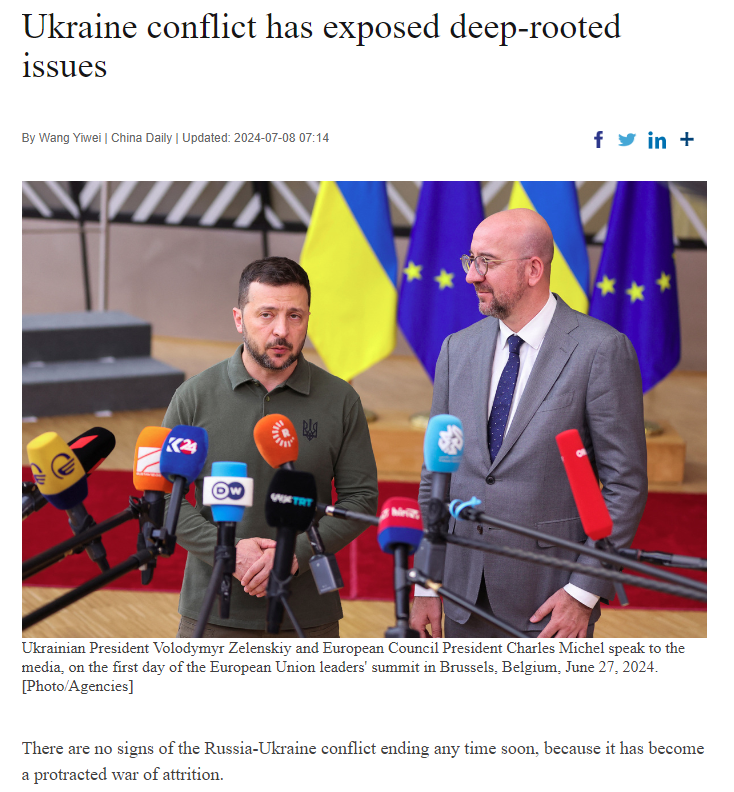LATEST INSIGHTS
Your Present Location: LATEST INSIGHTSWang Yiwei: Ukraine conflict has exposed deep-rooted issues
Source: China Daily Published: 2024-07-08

By Wang Yiwei
There are no signs of the Russia-Ukraine conflict ending any time soon, because it has become a protracted war of attrition.
By appointing a new defense minister with an economics background recently, Russia appears to have adopted a long-term sustainable approach to the conflict. The US-led West's goal seems to be to exhaust Russia, overthrow Russian President Vladimir Putin, and even disintegrate the Russian Federation. Conversely, Russia seeks to wear down NATO and the European Union, thereby fracturing the connections between the European Union and the United States. The conflict, a prelude to a new world order, may not fundamentally change the global landscape but serves as an early warning about the shifting stances of major countries.
Some Western observers' belief that a single phone call from China could end the Russia-Ukraine conflict is both an oversimplification of the issue and an insult to Russia, because it makes Russia seem like a country dependent on others without any mind of its own.
Despite Russia's economic limitations, its actions, diplomatic, military and economic, are not dictated by GDP alone. The West's long-standing disdain for Russia, exemplified by NATO's eastward expansion, is fueling the conflict, so accusing China of not intervening in the issue to seek its resolution is a diversionary tactic, designed to shift responsibility onto China and drive a wedge between Russia and China.
The US would not benefit from a swift resolution to Russia-Ukraine conflict, That's why it is keen on prolonging the conflict, because it believes that will weaken Russia. Washington's strategy is multifaceted — severing Europe's energy links with Russia, fueling discord within NATO, and straining Sino-Russian relations — and its overarching goal is to achieve multiple objectives. The US' moves have worsened the situation and its maneuverings have turned some Ukrainian politicians into pawns on its geopolitical chessboard.
The Russia-Ukraine conflict has highlighted the nuclear threat to Europe. Unlike past crises such as the Cuban Missile Crisis, the tensions today have reached unprecedented levels. NATO, despite its claims of defending freedom, operates under a charter that contradicts its actions. The organization's true purpose is to maintain the US' dominance in Europe, 'keep the Soviet Union out, the Americans in, and the Germans down', in first NATO Secretary General Hastings Ismay's words.
The factors driving the Russia-Ukraine conflict are complex and deep-rooted. The Westphalian system, based on nation states, is flawed when it comes to managing multi-ethnic regions such as Ukraine. The persecution of Russian-speaking populations in eastern Ukraine led to claims of genocide, prompting Russia to launch the 'special military operation'. Western media often overlooks these factors, focusing instead on vilifying Russia.
The European integration project, boosted by the 2012 Nobel Peace Prize, has not achieved full success. The EU's internal cohesion has come at the expense of external conflicts. The exclusion of countries such as Turkiye and its strained relations with Russia exemplify the EU's failure to create a truly inclusive community. The EU's strategy has led to a heightened state of confrontation between Russia and NATO, undermining regional security.
Moreover, the EU's lack of strategic autonomy means it cannot address its own security issues independently. Historical instances such as the Kosovo conflict and the ongoing Russia-Ukraine conflict, have exposed Europe's reliance on the US for military support. Without the support of NATO and US, Ukraine would struggle to defend itself against Russia.
The Russia-Ukraine conflict is a vivid illustration of the challenges posed by a world in flux. The Westphalian system's inadequacies, the pitfalls of European integration, and the lack of European strategic autonomy are key to understanding the ongoing Ukraine crisis. As we navigate the new global order, it is imperative that we recognize and address these underlying issues to foster a more stable and inclusive international community of shared future.
The author is a senior research fellow at the Institute of Global and Area Studies, Renmin University of China, and the Center for China and Globalization, a Beijing-based think tank.























































































 京公网安备 11010802037854号
京公网安备 11010802037854号





